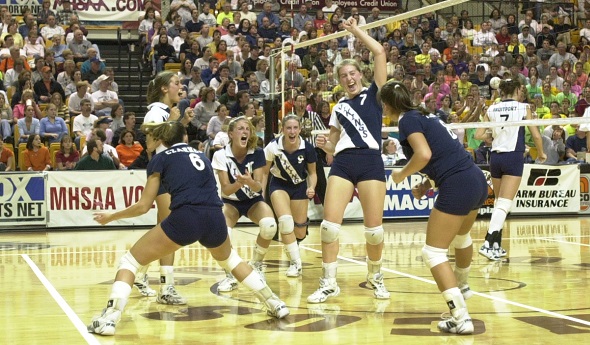
#TBT: Marysville Domination Unmatched
August 20, 2015
By Geoff Kimmerly
Second Half editor
The Marysville volleyball program built a pair of incredible streaks at the turn of this century, one that was equaled last season – and a second that likely won’t be approached.
Battle Creek St. Philip enters this fall with a chance to break Marysville’s record of eight straight MHSAA championships won from 1997-2004 – the Tigers tied that streak by again winning Class D a year ago. But no team in MHSAA history has come within 90 wins of Marysville’s incredible 192-match winning streak from 1996 into 2000.
 The 192-match winning streak also remains fourth nationally – Amherst’s Sweet Home Central won a ridiculous 292 straight matches from 1978-87.
The 192-match winning streak also remains fourth nationally – Amherst’s Sweet Home Central won a ridiculous 292 straight matches from 1978-87.
The photos above and below are from the 2000-01 Class B Final, a sweep of Fruitport 15-2, 15-9, that left the Vikings a mere 60-1 on the season after suffering that streak-breaking loss. Four players – Karen Conger with 19, Megan Harrison 15 and Kelly Thomas and Brittny Godlewski with 14 apiece – had double-digit kills in the match, and Thomas also had 22 assists. Marysville faced and defeated Fruitport in three straight Class B Finals from 2001-2003.
This summer, longtime Marysville coach John Knuth was inducted into the National High School Athletic Coaches Association Hall of Fame. He led the program from the 1983-84 season through 2007, then came back as co-coach for 2011, and finished with a record of 1,135-84-38 to rank fourth on the MHSAA coaching wins list in his sport.
PHOTOS: (Top) Marysville players celebrate match point against Fruitport in the 2001 MHSAA Class B Final at Western Michigan University. (Middle) Longtime Marysville coach John Knuth remains fourth in MHSAA history for volleyball wins with 1,135.

Five Fewer Volleyball Days?
December 12, 2017
When 90 percent of one of our key constituent groups has the same opinion, it’s worth talking about – even if the topic is a sacred cow.
This fall, 89.6 percent of 580 survey respondents told the Michigan High School Athletic Association they favor a week earlier end to the girls volleyball season.
Even more – 91.7 percent – favor starting practice two days earlier in August, the same day practice starts for football.
More than 98 percent of those respondents were local athletic directors, and each class (A, B, C and D) was almost equally represented.
If girls volleyball ended a week earlier, it would always conclude before the start of firearm deer hunting season and have a weekend largely to itself, in contrast to the current calendar that sees the Girls Volleyball Finals competing with the Girls Swimming & Diving Finals, the 8-Player Football Finals and 16 Semifinal games in the 11-Player Football Tournament. It’s a weekend of 100 audio and video broadcast hours, among the MHSAA’s very busiest weekends of the entire school year.
The MHSAA’s Girls Volleyball Tournament is the latest finishing high school association Girls Volleyball Tournament in the country, sharing that distinction with nine other states. Compared to our neighbors, the tournament in Michigan ends a week later than the Girls Volleyball Tournament ends in Illinois and Ohio, and two weeks later than the same tournament ends in Indiana and Wisconsin. Michigan’s girls volleyball season is currently one day shorter than in Ohio but four days longer than in Indiana, eight days longer than in Illinois, and 12 days longer than in Wisconsin.
Whether or not girls or boys basketball seasons eventually move up or back or flip-flop, the start and end of girls volleyball season are ripe for review, according to a large portion of local-level administrators. The opposite position is taken by the Michigan Interscholastic Volleyball Coaches Association, which has countered the online survey with a position paper that points out how much the girls volleyball season was shortened after girls volleyball moved from the winter season to the fall.
The Representative Council’s recent decision to switch the starting dates for girls and boys basketball seasons in the 2018-19 school year diminishes the urgency to decide between these different points of view.

